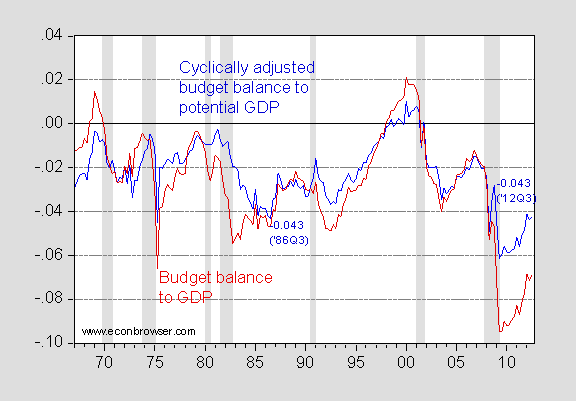The CBO has just released estimates of the cyclically adjusted budget balance (or, specifically, the budget balance without automatic stabilizers). The cyclically adjusted budget balance is a better measure of the fiscal stance. The evolution of this series is interesting.

Figure 1: Budget balance without automatic stabilizers as a ratio to potential GDP (blue), and budget balance as a share of GDP (red). NBER defined recession dates shaded gray. Source: CBO (March 2013), and CBO (February 2013), NBER, and author’s calculations.
As CBO reported last week (and Paul Krugman highlighted), the cyclically adjusted budget deficit next year is projected to be 1% of potential GDP, under current law.
One interesting observation is that the 2012Q3 value is the same as that in 1986Q3 (and only slightly greater in magnitude than that recorded in 2003Q3).
Thanks for this, Menzie. As much as I am in favor of shrinking the size of government and regulation as a matter of principle, I have a hard time convincing my fellow conservatives that focusing on the raw budget deficit itself is the wrong thing to look at. What we need to do is focus on getting the economy growing more rapidly. Then we’ll be able to get people off food stamps and into jobs, and tax revenues will rise from the increased economic activity as well. Being a conservative naturally skeptical of government programs is difficult when so many fellow conservatives have no clue what the heck they’re talking about.
And notice that at the business cycle peak (2007) we only recovered half of the budget deficit from the previous peak. Also notice that the Big Spender Jimmy Carter of the spendthrift disco era doesn’t look so bad.
We are four years into the recovery and still running “automatic stabilizers” of 3% of GDP.
At what point do we stop calling it “cyclical?”
So the ratio of one fantasy number to another fantasy number is not so bad. I feel better already!
The gap between the bold horizontal black line ( .00) and the red line is the amount of new debt incurred during the year that future taxpayers will be called upon to service…. The gap between the red and blue lines mainly reflects the quality of economic policy — fiscal, monetary, regulatory.
It should be noted that this “budget deficit” is calculated using Not Generally Accepted Accounted Principles (nGAAP). Using nGAAP is like being an AGW denier.
Rich Berger gets it: “So the ratio of one fantasy number to another fantasy number is not so bad. I feel better already.” From that we can conclude that progressive are fantasists.
Jay, after going through my climate blogs for the 2nd time this morning your obvious climate ignorance came to mind. Using nGAAP is like being an AGW denier.”
Other than the validity of an accounting to climate analogy, comparison your ignorance that for a growing period (16+ to 8+ years) all data sets show ZERO warming. Moreover this article shows what is an undeniable cause http://notrickszone.com/2013/03/15/global-warming-has-peaked-set-to-switch-to-cooling-if-you-look-at-history-this-is-easy-to-see/ and includes this graph: http://notrickszone.com/wp-content/uploads/2013/03/Ed_21.png
That is not to say that there is NO human component to warming, but is its not well defined nor understood. Human influence is clearly overwhelmed by nature. This chart of RSS satellite data shows clearly the major impacts of ENSO: http://www.woodfortrees.org/plot/rss/plot/rss/from:1980/to:1995/trend/plot/rss/from:2000/trend/plot/none There is no known human component to ENSO, AMO, and several ocean/natural influences.
I do not intend to capture this comment thread so wil not address comments unless specifically aimed at me.
Notice the recessions following the uptrends like clockwork.
Corev
I am not saying that progressives are fantasists. I am questioning Professor Chinn’s analysis.
Rich Berger, it was my conclusion, not yours. 😉
@Brian
You can fantasize about growth all you want, but we’re not going to get it. The long term trend of 3% growth occurred during times where there was an expanding or at least stable population of working aged folks. Now the fastest growing population is that of old people. No matter what you do to stimulate the economy, old people are not going to produce.
Anon – old people don’t need to produce. Younger people need to produce, and old people need money to pay for that production.
Cut Social Security, and old people won’t have as much money to pay for the things younger people can produce, and without the ability to charge ample money – young people won’t produce things for free.
Anonymous, you ignore completely the value of leisure, which is not included in GDP, for sure. Thus, there is an increased consumption of leisure, which is a good thing. This only one of the problems with GDP, the other being the vast underground economy (at least in Texas).
matt
I don’t think you truly grasp the concept of money. Money is merely a claim on other people’s labor or goods. Imagine for a moment that there are 100 people on an island. 80 are young and 20 are too old to work. The 80 support the 20 and all is well. Over time, the population ages yet remains stable numerically, and after some time there are 40 young and 60 old. The 60 old saved pieces of paper that are used as currency, but you can’t eat the paper. Thus the 40 are still having to support the 60 even if the 60 had savings. More time passes and 20 people are now supporting 80. At some point this blows up.
Social security comes from the young people. Your argument is saying “we can’t take less money from young people to give it to old people because then old people won’t give it back to young people in exchage for goods and services.” SS is effectively making slaves out of the younger generations. Old people are putting X in and taking 1.5X out. Rick Perry might be an idiot, but he was right. SSI is a ponzi scheme.
http://finance.yahoo.com/news/social-security-not-deal-once-165406538.html